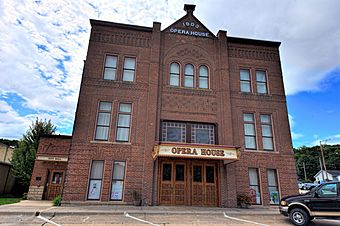Elkader Opera House facts for kids
Quick facts for kids |
|
|
Elkader Opera House
|
|
|
U.S. Historic district
Contributing property |
|
 |
|
| Location | 207 N. Main St. Elkader, Iowa |
|---|---|
| Built | 1903 |
| Architect | Shick & Roth |
| Part of | Elkader Downtown Historic District (ID12000095) |
| NRHP reference No. | 76000748 |
| Added to NRHP | October 8, 1976 |
The Elkader Opera House is a special old building in Elkader, Iowa, United States. It's a place with a lot of history! This building was added to the National Register of Historic Places in 1976. This means it's an important place that should be protected. Later, in 2012, it became part of the Elkader Downtown Historic District.
A Look Back in Time
The Elkader Opera House first opened its doors on November 27, 1903. It was built after an earlier opera house in the same spot burned down the year before. The very first show performed on its stage was "The Governor's Son" by George M. Cohan. The Cohan Brothers performed it.
When it first opened, the Opera House was part of a big performance route between Chicago and Minneapolis. Famous performers, like Ed Wynn, even appeared on its stage. Over the years, this building has been used for many different things. It has been a community room, a dance hall, and even a roller skating rink!
It also housed a library, a fire station, and offices for economic development. The city hall of Elkader is still located there today. You can also find the Abd el-Kader Sister City Museum inside.
In 1949, the front of the first floor was changed quite a bit. This was done so it could be used as a firehouse. Two large double doors were put in for the firetrucks. Later, in 1963, a project began to make the auditorium look like it did when it first opened. The building was also greatly updated in 2004. Today, the Opera House is home to the Keystone Barbershop Chorus and the Opera House Players.
What Does It Look Like?
The Elkader Opera House is a three-story building made of brick. The front of the building looks the same on both sides, which is called symmetrical. In the middle section, there are three windows with round tops. These windows have fancy brick designs above and below them.
There is also special brickwork near the top edge of the building on the sides. The three main sections of the building are separated by flat, column-like brick parts. An entrance on the side of the building was made especially for the city hall offices.
 | James Van Der Zee |
 | Alma Thomas |
 | Ellis Wilson |
 | Margaret Taylor-Burroughs |



